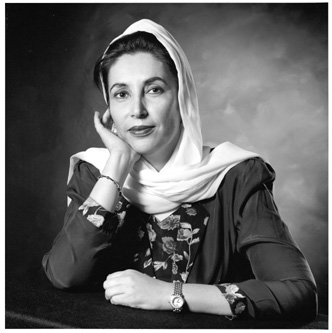Benazir Bhutto Reflects on Working Toward Peace
 Of
trying to make peace, I know a little. To make peace, one
must be an uncompromising leader. To make peace, one must
also embody compromise.
Of
trying to make peace, I know a little. To make peace, one
must be an uncompromising leader. To make peace, one must
also embody compromise.
Throughout the ages, leadership and courage
have often been synonymous. Ultimately, leadership requires
action: daring to take steps that are necessary but unpopular,
challenging the status quo in order to reach a brighter
future.
And to push for peace is ultimately personal sacrifice,
for leadership is not easy. It is born of a passion, and
it is a commitment. Leadership is a commitment to an idea,
to a dream, and to a vision of what can be. And my dream
is for my land and my people to cease fighting and allow
our children to reach their full potential regardless of
sex, status, or belief.
In pursuit of peace in my land and more broadly between
East and West, I must travel the world. As a leader, the
travel is necessary. As a woman and a mother, I miss my
children. It is difficult to explain to a nine-year-old
why his mother can't be at home for his birthday. But leadership
involves making family sacrifices. Pursuing peace means
rising above one's own wants, needs, and emotions. Leadership
is tough. There is no question of being tired; there are
no holidays.
Peace is most often seen as resolving struggles between
individuals. More broadly, finding peace means resolving
struggles between ideologies, religions, and cultures. As
the first woman leader of an Islamic nation, peace has been
for me first and foremost resolving a struggle between the
sexes.
Through much of history, women's roles in making peace have
been confined within the family. Reaching peace and understanding,
and finding compromise between families, between villages,
and between nations has been the responsibility of men.
I dare say that families have been more peaceful than nations.
Women leaders have had to pay a high price. We are often
viewed as interim rallying points in times of crisis, and
then have to fight men who view us as rubber stamps for
their own authority.
Women leaders seeking peace pay a high price to attain and
hold leadership. When I was expecting my first child, my
opponents called fresh elections. They thought that childbearing
would prevent a woman from campaigning. They were wrong.
Yes, I could not openly share the joy of expecting a child-to
go shopping for baby clothes or afford morning sickness.
The first generation of women leaders felt a need to show
they were stronger than men. They often fought wars or tried
to sound as warlike as men. Twenty years later, I see a
change. Women leaders are now more associated with social
development, with nurturance and a sensitivity to human
problems.
For women leaders, the obstacles are greater, the demands
are greater, the barriers are greater, and the double standards
are more pronounced. Ultimately, the expectations of those
who look at us as role models are greater as well. And for
all women, it is critical that we succeed.
Leadership is to do what is right by educating and inspiring
an electorate, empathizing with the moods, needs, wants,
and aspirations of humanity.
Making peace is about bringing the teeming conflicts of
society to a minimal point of consensus. It is about painting
a new vision on the canvas of a nation's political history.
Ultimately, leadership is about the strength of one's convictions,
the ability to endure the punches, and the energy to promote
an idea.
And I have found that those who do achieve peace never acquiesce
to obstacles, especially those constructed of bigotry, intolerance,
and inflexible tradition.
Biography
Resources for Teachers and Students